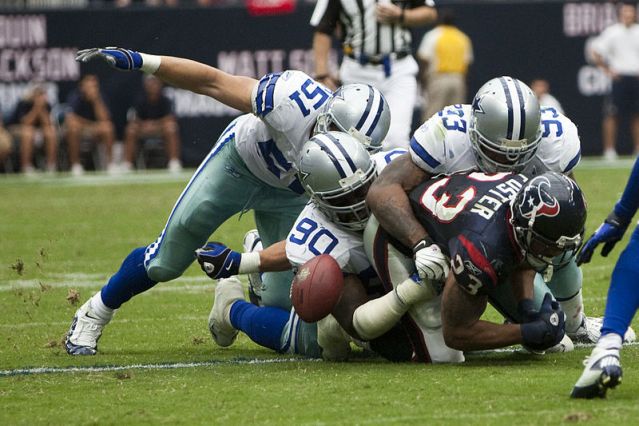
Diet
How Your Favorite Team Is Making You Pack on Pounds
The hidden dangers of being a fan, and how to deal with them.
Posted December 27, 2014

I recently came across a fascinating study done by French researchers who looked at the eating habits of NFL fans. Not only did they find the connection between losing teams and eating more, but fans of winning teams ate healthier, and less food overall.
As Professor Pierre Chandon told USA Today: “One day after a defeat, Americans eat 16 percent more saturated fat, and 10 percent more calories. But on the day after a victory of their favorite team, then it’s the opposite. They eat more healthily. They eat 9 percent less saturated fat, and 5 percent fewer calories. There was no effect in cities without a team or with a team that didn’t play.”
But gaining weight isn’t the only factor a diehard fan may experience. Other studies have found fans can be susceptible to heart attack, stress, and depression.
So, aside from switching allegiance to a more successful NFL team, how can you put up a great defensive strategy against the battle of the bulge?
In my experience, relying on a Pandora’s box-style principle known as the “abstinence violation effect” is your best defense. It’s a great concept when dealing with anything from alcohol abuse to other, smaller habits that we just can’t seem to kick—such as, say, stress eating.
The abstinence violation effect works as follows: Say a box of Double-Stuf Oreos has found its way into your apartment, openly taunting your so-far-successful diet. Usually you can scarf down a sleeve of these cookies at once and think nothing of it, but the rational you—the dieting you—knows better than to give in.
But then you think, “Well, one isn’t so bad, is it? It’s not a crime to eat one Oreo.” You open the container, pick out a single Oreo, and eat it. And then, after it hits the spot, you realize just one more won’t throw your diet off the rails. It makes no sense to eat just one oreo. So you eat a second.
And after you eat the second, you eat a third. After all, you’ve already eaten two. So much for “sticking to your diet.” That ship has sailed, right? So you may as well enjoy yourself now.
All of a sudden, you’ve eaten the whole sleeve. And if you’re anything like me, you’re now left feeling a little queasy, both physically and emotionally, for the rest of the night.
The abstinence violation effect is, in a nutshell, like the Pringles slogan: “Once you pop, you just can’t stop.” So the best way avoid these slips is not to pop: to substitute the unhealthy behavior with something else. I often tell my patients that if they find themselves tempted to “cheat” on a behavior plan, they should step outside for 60 seconds and get some fresh air instead. Even if it’s just a matter of leaving your apartment, walking down the hall, and walking right back, it makes a huge difference. They’re amazed at how quickly the urge passes.
Suppose you’re not necessarily on a diet; you just want to avoid gaining an extra ten pounds all because the Jets can’t seem to catch a break in the AFC East. The psychology is extremely similar. We like to eat junk food when we’re feeling down, whether it’s from a bad breakup or a disappointing game. To break the habit, sports fans need to take the same strategy as our Oreo addict by replacing the weight-gaining behavior with something more positive.
One clear (and possibly easiest) solution is to surround yourself with healthy snacks when watching the big game. If you’re out, get a glass of water every time you get the urge to munch. If you’re home, let off some frustration by doing 5 push-ups.
Of course, you can always just root for the winning team. But then again, this whole post has been about avoiding tempting but wrong choices—and I heartily advise against switching allegiances mid-season. If you feel tempted to do that during a game, I recommend a distraction until you come to your senses. How about Oreos?
For more on sport psychology and motivation, follow me on Twitter or Facebook. You can also watch me talking about sport fan health on CBS This Morning here.

